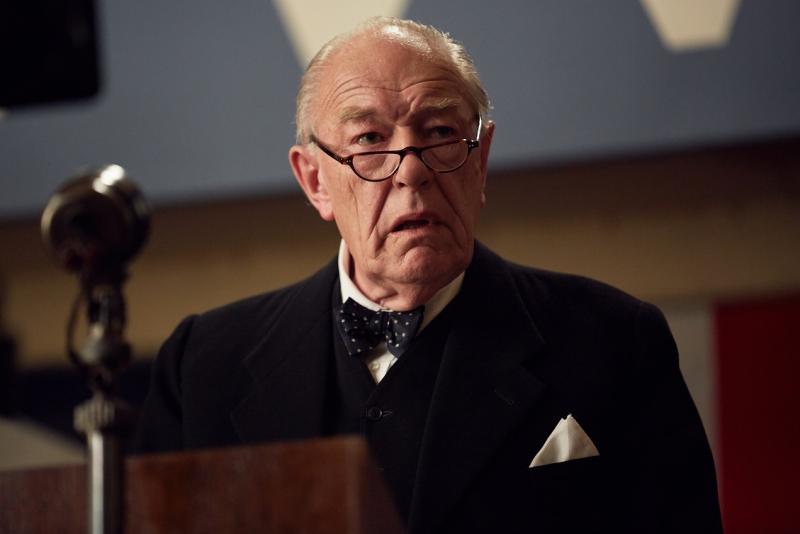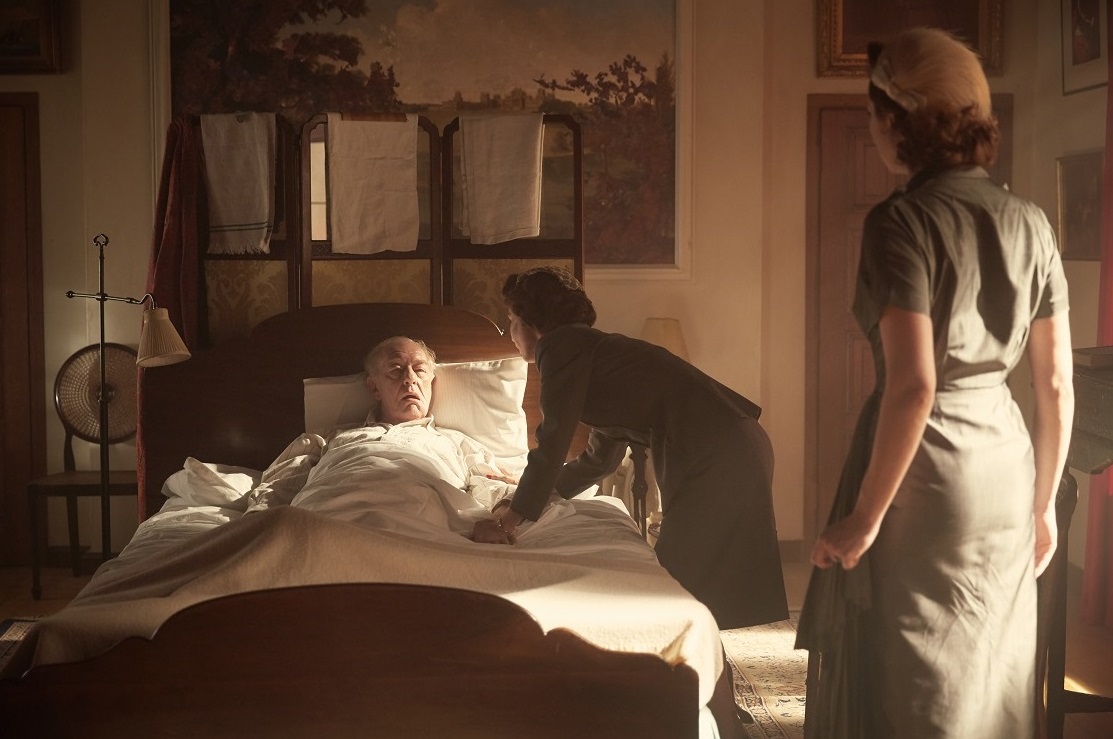Churchill's Secret, ITV | reviews, news & interviews
Churchill's Secret, ITV
Churchill's Secret, ITV
Michael Gambon powerful as the PM in sickness, assailed by memories

When it comes to losing power, and powers failing, Michael Gambon has once again proved himself the ruler of choice.
Writer Stewart Harcourt adapted Jonathan Smith's novel telling the story of what happened when, at the end of June 1953, Winston, in his second term as prime minister, suffered a severe stroke. (The book has the letters “KBO” appended to its title, standing for “Keep buggering on”, apparently one of the great man’s choice phrases, and one which nicely captures the very English way of doing things here.) The novel embroidered real life by introducing a nurse, Millie (Romola Garai, capable in a not quite effortless, but still rather English rose sort of way, bottom image below), who’s spirited away to look after him. She gives us a fresh point of view on proceedings, as an obsever and increasingly a confidante of some of those involved.
 The difficulty of the situation, and the reason for keeping Churchill's condition quiet, was that his foreign secretary, Anthony Eden, was also out of action, being operated on for a gall bladder problem in America – of all places: why not the NHS, when that young structure received prominent namecheck endorsement elsewhere in the drama? Which meant, in the words of newspaper baron Max Beaverbrook, it was a “headless government in crisis” kind of moment. Though the news agenda in those days wasn’t exactly a 24-hour one, Fleet Street still had to be reassured before parliament. They proved more kindly that would be expected these days: the press proprietors descended on Churchill’s country home Chartwell, which was where most of the action took place (and where exteriors, glorious gardens particularly, were shot) and agreed to keep schtum.
The difficulty of the situation, and the reason for keeping Churchill's condition quiet, was that his foreign secretary, Anthony Eden, was also out of action, being operated on for a gall bladder problem in America – of all places: why not the NHS, when that young structure received prominent namecheck endorsement elsewhere in the drama? Which meant, in the words of newspaper baron Max Beaverbrook, it was a “headless government in crisis” kind of moment. Though the news agenda in those days wasn’t exactly a 24-hour one, Fleet Street still had to be reassured before parliament. They proved more kindly that would be expected these days: the press proprietors descended on Churchill’s country home Chartwell, which was where most of the action took place (and where exteriors, glorious gardens particularly, were shot) and agreed to keep schtum.
But Churchill’s Secret wasn’t really about the realpolitik of the situation, though Winston did get a bit het up about missing the Bermuda conference at which he wanted to lobby for a nuclear bomb-free world. Was anyone else put in mind of Stalin’s death earlier that same year, a situation when the passing of one world leader really would be a life-or-death matter for his henchmen assembled, jackal-like, to decide inheritance? No secret police here, though the row over dinner which Winston’s long-suffering wife Clemmie (Lindsay Duncan, luminous) had to witness when she brought her children together would have been at home chez Stalin (pictured below), albeit choreographed by Cecil Beaton. There was a trio of daughters divided, Lear-like, into opposite camps, with the youngest Mary (Daisy Lewis) the Cordelia figure in faithful attendance. For sheer awfulness, son Randolph (Matthew Macfadyen) gobbled down the alcoholic biscuit in this soiled family circle, though we won’t forget how fond his father was of a tipple, not least because a brandy was the first thing, along with a cigar, that he ordered on regaining consciousness.
There was a trio of daughters divided, Lear-like, into opposite camps, with the youngest Mary (Daisy Lewis) the Cordelia figure in faithful attendance. For sheer awfulness, son Randolph (Matthew Macfadyen) gobbled down the alcoholic biscuit in this soiled family circle, though we won’t forget how fond his father was of a tipple, not least because a brandy was the first thing, along with a cigar, that he ordered on regaining consciousness.
“They are what they are,” Clemmie opined philosophically, while Churchill's doctor (Bill Paterson) noted that there was a price for greatness, “but the great seldom pay it themselves”. The immediate pain here was hers, as the wife who had seen her husband overdoing it all his life, practically working himself to death. Lindsay Duncan (top image) caught a kind of rarefied remoteness in Clemmie, barely able to hope that her husband’s illness – if he survived it, that is – would at last allow him to leave public life, and that they might live out the rest of their days together.
 And there was another secret here, even more poignant than Clemmie’s position, a piece of family history that kept the couple close, although they clearly never talked of it: one of the drama’s finest scenes had Clemmie confiding to Millie about it, overheard (unbeknownst to them) by Winston. Like Citizen Kane’s Rosebud, it was a floral recall of something lost that remained painfully missed. It was as if Winston's stroke had rearranged his subconscious to bring back those memories – those soft-focus, beach days of childhood, which so often can become a cliché but here in Sturridge’s hands were affectingly captured together with their associated snatch of melody.
And there was another secret here, even more poignant than Clemmie’s position, a piece of family history that kept the couple close, although they clearly never talked of it: one of the drama’s finest scenes had Clemmie confiding to Millie about it, overheard (unbeknownst to them) by Winston. Like Citizen Kane’s Rosebud, it was a floral recall of something lost that remained painfully missed. It was as if Winston's stroke had rearranged his subconscious to bring back those memories – those soft-focus, beach days of childhood, which so often can become a cliché but here in Sturridge’s hands were affectingly captured together with their associated snatch of melody.
That family loss really was the heart of Churchill’s Secret, but as Winston gradually recovered we came back into his more male world of jocular humour. He was struggling to regain his speech, his final goal being to address the Margate party conference – how party conferences have grown! – before handing on the reins (main picture). That closing dramatic arc assumed a familiar, even programmatic structure that wouldn’t have been out of place in that other recent piece of public-figure, high-tension oratory, The King’s Speech. Stewart Harcourt’s script was often very funny: if it had a weakness, it was that the bon mots were tossed out too aphoristically, certain that they would "bounce" at just the right moment. Which gave it something of a stage feel, while what Sturridge achieved belonged much more to the (big) screen.
The future of Arts Journalism
You can stop theartsdesk.com closing!
We urgently need financing to survive. Our fundraising drive has thus far raised £49,000 but we need to reach £100,000 or we will be forced to close. Please contribute here: https://gofund.me/c3f6033d
And if you can forward this information to anyone who might assist, we’d be grateful.

Subscribe to theartsdesk.com
Thank you for continuing to read our work on theartsdesk.com. For unlimited access to every article in its entirety, including our archive of more than 15,000 pieces, we're asking for £5 per month or £40 per year. We feel it's a very good deal, and hope you do too.
To take a subscription now simply click here.
And if you're looking for that extra gift for a friend or family member, why not treat them to a theartsdesk.com gift subscription?
more TV
 In Flight, Channel 4 review - drugs, thugs and Bulgarian gangsters
Katherine Kelly's flight attendant is battling a sea of troubles
In Flight, Channel 4 review - drugs, thugs and Bulgarian gangsters
Katherine Kelly's flight attendant is battling a sea of troubles
 Alien: Earth, Disney+ review - was this interstellar journey really necessary?
Noah Hawley's lavish sci-fi series brings Ridley Scott's monster back home
Alien: Earth, Disney+ review - was this interstellar journey really necessary?
Noah Hawley's lavish sci-fi series brings Ridley Scott's monster back home
 The Count of Monte Cristo, U&Drama review - silly telly for the silly season
Umpteenth incarnation of the Alexandre Dumas novel is no better than it should be
The Count of Monte Cristo, U&Drama review - silly telly for the silly season
Umpteenth incarnation of the Alexandre Dumas novel is no better than it should be
 The Narrow Road to the Deep North, BBC One review - love, death and hell on the Burma railway
Richard Flanagan's prize-winning novel becomes a gruelling TV series
The Narrow Road to the Deep North, BBC One review - love, death and hell on the Burma railway
Richard Flanagan's prize-winning novel becomes a gruelling TV series
 The Waterfront, Netflix review - fish, drugs and rock'n'roll
Kevin Williamson's Carolinas crime saga makes addictive viewing
The Waterfront, Netflix review - fish, drugs and rock'n'roll
Kevin Williamson's Carolinas crime saga makes addictive viewing
 theartsdesk Q&A: writer and actor Mark Gatiss on 'Bookish'
The multi-talented performer ponders storytelling, crime and retiring to run a bookshop
theartsdesk Q&A: writer and actor Mark Gatiss on 'Bookish'
The multi-talented performer ponders storytelling, crime and retiring to run a bookshop
 Ballard, Prime Video review - there's something rotten in the LAPD
Persuasive dramatisation of Michael Connelly's female detective
Ballard, Prime Video review - there's something rotten in the LAPD
Persuasive dramatisation of Michael Connelly's female detective
 Bookish, U&Alibi review - sleuthing and skulduggery in a bomb-battered London
Mark Gatiss's crime drama mixes period atmosphere with crafty clues
Bookish, U&Alibi review - sleuthing and skulduggery in a bomb-battered London
Mark Gatiss's crime drama mixes period atmosphere with crafty clues
 Too Much, Netflix - a romcom that's oversexed, and over here
Lena Dunham's new series presents an England it's often hard to recognise
Too Much, Netflix - a romcom that's oversexed, and over here
Lena Dunham's new series presents an England it's often hard to recognise
 Insomnia, Channel 5 review - a chronicle of deaths foretold
Sarah Pinborough's psychological thriller is cluttered but compelling
Insomnia, Channel 5 review - a chronicle of deaths foretold
Sarah Pinborough's psychological thriller is cluttered but compelling
 Live Aid at 40: When Rock'n'Roll Took on the World, BBC Two review - how Bob Geldof led pop's battle against Ethiopian famine
When wackily-dressed pop stars banded together to give a little help to the helpless
Live Aid at 40: When Rock'n'Roll Took on the World, BBC Two review - how Bob Geldof led pop's battle against Ethiopian famine
When wackily-dressed pop stars banded together to give a little help to the helpless
 Hill, Sky Documentaries review - how Damon Hill battled his demons
Alex Holmes's film is both documentary and psychological portrait
Hill, Sky Documentaries review - how Damon Hill battled his demons
Alex Holmes's film is both documentary and psychological portrait

Add comment